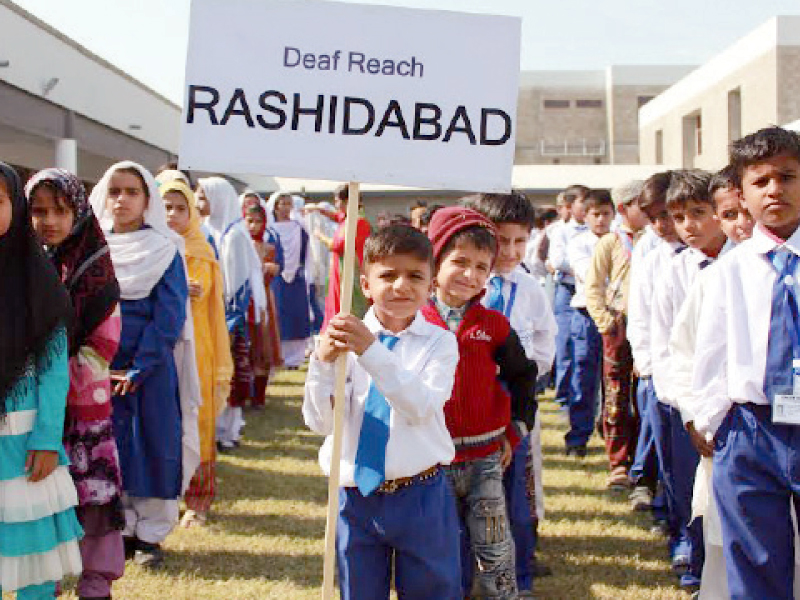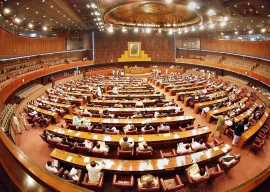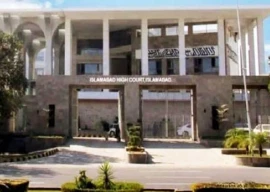
Speaking at the inauguration of the new deaf reach school in Rashidabad on Saturday, Sindh education minister Nisar Ahmed Khuhro said: “You are not just building a school. You are building a future for these kids.” The minister hoped the school will help the children be productive members of society. He lauded the efforts of the Rashid Memorial Welfare Organisation (RMWO) that donated the land and helped build the school with the funds received from USAID. The provincial planning and development department also helped establish the school.

The inauguration ceremony kicked off with students from Deaf Reach Schools in Karachi, Sukkur, Hyderabad and Rashidabad, accompanied by their teachers, parents and donors, singing the national anthem in sign language. This was followed by a tour of the campus. The US consul-general, Brian Heath, in his address, stressed that it was not enough to simply construct a building; what was more important was to involve the community to keep the schools running.
The consul-general said that the work done on the school had far exceeded his expectations. “This not only shows the resilience of the people of Pakistan but also their potential.” He hoped the institution will help the deaf children realise their full potential.
“This institution should be able to produce bureaucrats and politicians, because kindness and compassion are the things that the deaf can hear and the blind can see”, said Air Commodore Shabbir Ahmed Khan, the executive director of RMWO. “The aim of building this school here is to make it available for that segment of society that cannot afford to pay for it”, he added.
The Rashidabad Campus
Speaking about the campus, the US consul-general remarked that it had the potential to become a university for the deaf one day. “It could become the second deaf university in the world after the one in Washington DC,” he said. “That will take time but we should keep striving towards that goal.” The RMWO has given the responsibility of running the campus to the Family Educational Services Foundation (FESF), the parent organisation of deaf reach schools in Pakistan. This particular campus, however, pales the rest in comparison due to its sheer size and facilities. The campus has been upgraded to the level of a training centre and college.
Richard Geary, the executive director of the deaf reach schools, told the audience that 120 children from 13 villages were currently enrolled in the school in Rashidabad. “The school is also providing them pick and drop services “.
The campus can accommodate 1,000 students and boasts state-of-the-art facilities such as a resource centre area and dormitory for 100 students, 11 accommodation units for faculty members and their families, four workshops and conference rooms, a library and computer centre, a small zoo, a basketball court and children’s play area, fruit orchards and a huge assembly lawn.
Geary also praised the neighbourhood. “This is a specialised city that boasts facilities for the deaf and blind children as well as people with other disabilities”.
Speaking about his vision for Rashidabad, Shabbir Khan said: “We intend to make a home for mentally and physically challenged people as well as a home for senior citizens here.” Richard Geary told The Express Tribune that building a senior citizens’ home in the neighbourhood was a brilliant idea because senior citizens could actually help the students by transferring their knowledge and skills.
The brains behind Deaf Reach schools
Richard Geary has lived in Pakistan for the last 25 years. When Richard and his wife, Heidi, had a son who was found to be deaf, they tried to look for a school to send him to. “There was no school for the deaf and we realised there were other people who were facing a similar dilemma,” he reminisced.
It all started off with classes every Friday afternoon at Hotel Metropole in Karachi. “The room was given to us free of cost by the hotel management,” he explained. Subsequently, they managed to open a small centre in Saddar with a one-room office on the fifth floor of a building. The Deaf Reach School in Karachi now enjoys the status of a college with eight deaf college students. From a class in a rented room to seven schools across Pakistan, the FESF has certainly come a long way.
Published in The Express Tribune, December 9th, 2014.







































COMMENTS
Comments are moderated and generally will be posted if they are on-topic and not abusive.
For more information, please see our Comments FAQ